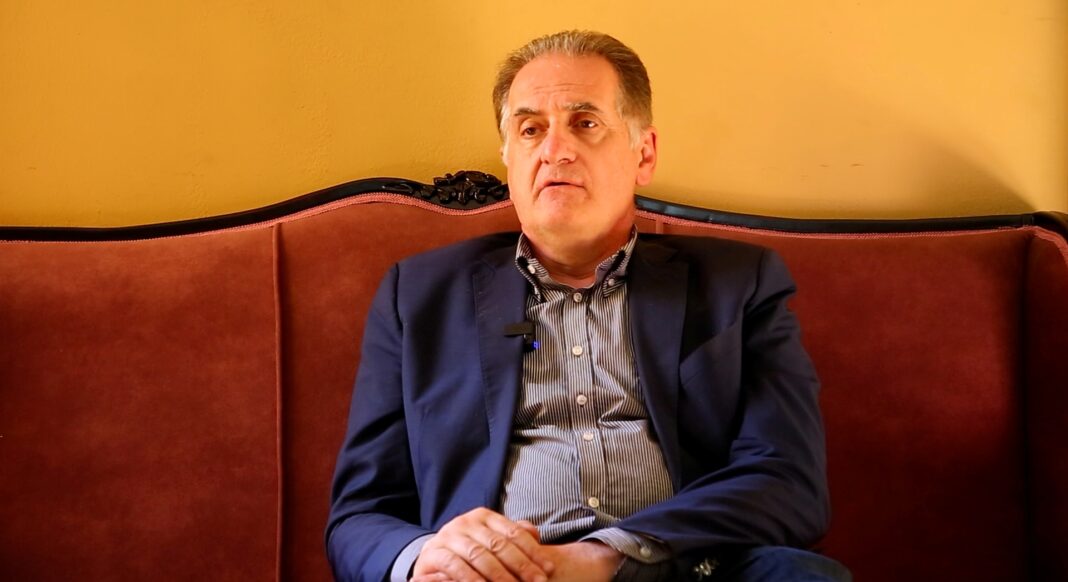Many politicians and public figures have emphasized that Georgia has an unprecedented opportunity for further integration with Europe, an opportunity previously unavailable. During the period immediately following Georgia’s declaration of independence, the nation faced numerous challenges, and securing support from the West took a lot of work due to differing approaches and perceptions at the time. However, the geopolitical landscape has since evolved significantly. We will explore the importance of Europe and issues surrounding European integration with Konstantine Gamsakhurdia, the General Director of the National Library of the Parliament of Georgia. Notably, Mr. Gamsakhurdia has also been active in politics and is the son of Zviad Gamsakhurdia, Georgia’s first President.
Mr. Konstantine, let’s discuss Europe’s advantages from a political and socio-economic perspective.
The question itself is complex. Generally, Europe is a more complicated and challenging phenomenon than it appears at first glance. What is Europe? Is it just a continent crisscrossed with railroads and strewn with power lines, or is there something more? We must remember that Europe is a cradle of great traditions, many cultural monuments, museums, exciting and substantial literature, and high-level studies at universities.
On the other hand, contemporary Europe is a union of 27 countries with a political center and relatively close foreign policies, economies, and political systems. The key here is the democratic system, republicanism, even in countries with a monarchy, where the republic is the main structure and the monarchy is merely a relic of the past.
Europe is a universalist model in the sense that it is undergoing modernization and adhering to the concept of intellectual self-realization. Modernization is rapidly progressing in various fields and represents an advanced paradigm that other countries should aspire to.
The West is currently quite active towards us. After the dissolution of the USSR in the 1990s, why was there a setback, or would more support back then have led to a different geopolitical situation today?
The European Union’s creation and the USSR’s dissolution were almost parallel processes. The European Union could hardly have acted independently. It was heavily dependent on American allies, and in reality, the Americans and the British made the decisions. Later on, Paris and Berlin joined them in decision-making. At that time, a different approach was generally dominated among them and in American politics. They still believed that the Soviet Union would survive in some form and even supported it. Their courtesies, including America’s leadership towards Zviad Gamsakhurdia, were of this nature – opposing the dynes. What does opposing the dynes mean? The Soviet Union had to survive in some form, which was also in the interest of the USA.
Unfortunately, at that time, the West did not have a clear and realistic concept of dealing with the Soviet Union and the Russian Federation. They could not realize that the so-called deep state, the depth-governed state of the Soviet Union, remained and collapsed only in facade, staying deeply rooted in the Russian Federation and continuing to exist.
The Western paradigm sought cooperation with the Soviet Union, but it has recently become clear that this is impossible. The former Soviet space, along with Russia, is not ready to accommodate the West and will always continue to confront and create threats.
At that time, other issues were a priority, but how did Mr. Zviad imagine relations with Europe?
The president’s approach to relations with Europe can be discerned from his foreign policy actions. Specifically, during his presidency, a delegation led by the Speaker of Parliament was sent to the USA while the Foreign Minister visited France and Germany. However, these diplomatic missions were unsuccessful, as Western countries avoided establishing direct connections with Georgia’s independent authorities.
However, some successes, such as Romania’s recognition of Georgia, meant something. Immediately after the 1992 ceasefire, 28 countries, including the USA, recognized Georgia. This policy had results, and that was recognition. The West did not wholly change its dependency before, but it changed over time, and it was especially apparent in recent years.
What can Georgia offer Europe that is not just of temporary interest but a long-lasting essential need?
Geography is critical. Look at the map. It’s quite a distance from the Arctic Ocean down to the Arabian Sea, and the only air gate between them is Georgia and the Caucasus; elsewhere, planes cannot fly. Otherwise, you would have to fly over Africa, which is a long and cumbersome route. Elsewhere, movement is practically impossible. Georgia-Azerbaijan is the air gate that connects the two hemispheres of the world; incredible but true.
Then comes the Israel-Palestine-Iran-Iraq zone, and here, too, planes cannot fly. Then come the Houthis, who threaten commercial ships, and it’s not excluded that they might target planes in the future.
The Georgia-Azerbaijan section is a narrow corridor that unites the East and the West. If this were to close, say due to destabilization, consider that the West and the East are cut off from each other.
What predictions can be made about the Russia-Ukraine war, and what situation will we face in the region, in Europe, on the world map after the war?”
This depends on how it ends and under what conditions it ends. Ukraine must continue to exist, and Russia will continue on its own. Let’s see how this territory will be divided. Of course, it is essential for us that Ukraine restores its territorial integrity, as much as Georgia can restore its territories in such a case, and it will not be a precedent that a neighboring country can brutally violate the territorial integrity of another country with aggression and assault.
It is impossible to freeze the conflict; neither side will allow it. A victor must emerge, not a defeated one.

